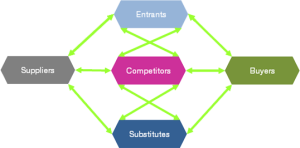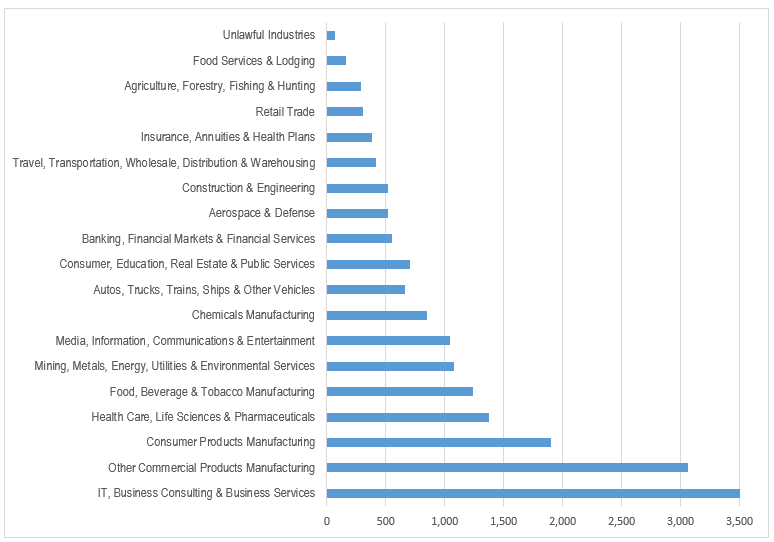Our Sophisticated Knowledge Graph
unique dynamic competitive context
Knowledge Graph Demonstrations
by theme topic [robotics ecosystem] and companies [Apple, Google and Kinova] Reveal the granular, contextual and dynamic natures of different themes and associated companies
We Map 20,000 Industry Classifications (examples)
Sub-Sectors(10 of 125) |
Groups(10 of 545) |
Sub-Groups(10 of 2,700) |
Industries(10 of 18,900) |
Aerospace 
|
Aircraft | Jet Manufacturing | Jets / Commercial Long-Haul Jet Manufacturing |
| Corporate Banking | Investment Banking & Capital Markets | Equity Underwriting Services | Private Equity - Venture Capital Funding & Seed Capital Funding |
| Basic Chemicals Manufacturing | Agricultural Films & Crop-Related Products | Fungicide Manufacturing | Fungicides / Fungicide Manufacturing |
| Commercial Construction & Engineering | Commercial Construction | Bridge & Tunnel Construction | Bridge Construction |
| Garden Products, Tools & Robots | Hand Tools, Power Tools & Consumer Robots | Power Garden Tools | Mowers / Lawn Riding Mowers Manufacturing |
| Lodging & Vacation Services | Lodging & Lodging-Related Services | Hotels & Resorts with Gambling | Hotels & Resorts / Gambling Casino Hotels, Hotel Casinos & Casino Resorts 
|
| Restaurants & Food Management Services | Restaurants 
|
Casual Full-Service Restaurants | Casual Full Service Restaurants / Italian Food |
| Alcoholic Beverage Manufacturing | Beer, Other Alcoholic & Alcoholic-Free Drinks,/td> | Beer & Malt Liquors Manufacturing | Beer / Ale Manufacturing & Lager Beer Manufacturing |
| Life Sciences Products Manufacturing | Life Sciences Biotech Products & Equipment | Molecular Diagnostics PCR / Real-Time | PCR Equipment & qPCR Equipment Manufacturing |
| Personal & Commercial Insurance | P&C Personal Insurance | Personal Auto Insurance 
|
Personal Auto / Standard Voluntary Car Insurance |
Early theme discoveries are clear competitive advantages. Yet, such early discoveries can only result from a real-time perception of an expansive market context – which are much more than an awareness of a particular company.
To achieve a realistic competitive context, Discovery Patterns teamed up with Industry Building Blocks [IBB]to create the most powerful real-time context engine for market intelligence. IBB was founded by Alan S. Michaels, who envisioned an alternative to NAICS to support corporate planning and competitive intelligence. At this time the Industry Building Blocks Classification System(TM) contains over 20,000 unique industries, a total that is 15X more granular than classifications like NAICS and SIC codes. The modular nature of IBB classifications enables Discovery Patterns to start its analytic engines with competitively relevant industry combinations, competitive ecosystems, ETF’s, themes/motifs, partner groupings and ad hoc combinations.

The combination of IBB classifications plus Discovery Patterns Ai produces Industry Graph. Industry Graph is an advanced form of business and financial discovery from unstructured data like news, blogs, texts, social media and multimedia. Like other forms of discovery, Industry Graph anticipates investment relevancy, even if an investor does not know how to define the investment competitive environment. Industry Graph also provides our clients with a disciplined and ever updated definition of competitive interests like changing competitors, buyers, suppliers, market substitutes, and emerging competitors. Industry Graph is in sync with similar Internet information advancements like Google Knowledge Graph, Facebook’s Social Graph and Linkedin's Economic Graph which also anticipate user interests.

Most searching and listening tools require clients to know on which topics they need to focus their tools. Not so with Discovery Patterns. We start with an expansive ecosystems which embodies include a general definition of a client’s business and financial interests. We apply the massive scope and discipline of Industry Graph to expand the detail of potential theme discoveries. Our clients can apply their unique market perspective. We leverage that perspective with our Industry Graph detail and continuous theme discovery processes to discover the important and changing connections among numerous industry participants and influencers.
The Porter Foundation of Competitive Context
The IBB classification System [TM] is unique not only because of its 20,000 industry granularity, but also because the industries were defined and analyzed by leveraging the five forces model – the competitive forces first advocated by Michael E. Porter of the Harvard Business School. By tracking and seeking interactions among relevant industry competitors, buyers, suppliers, entrants and substitutes, we discover early trends while they are generally hidden from public awareness.

Top Level Detail of IBB Sectors and Distribution of 20,000 IBB Industries

